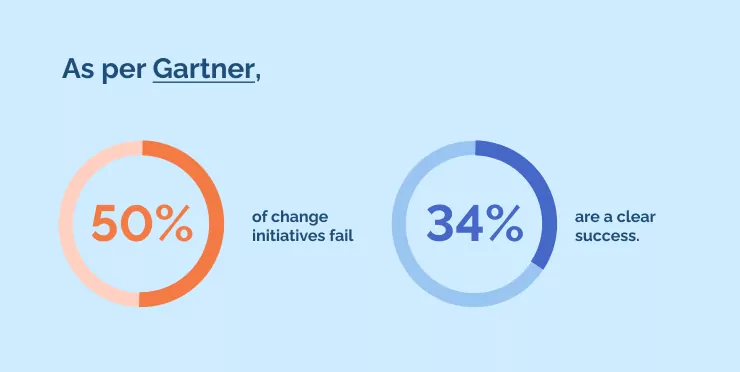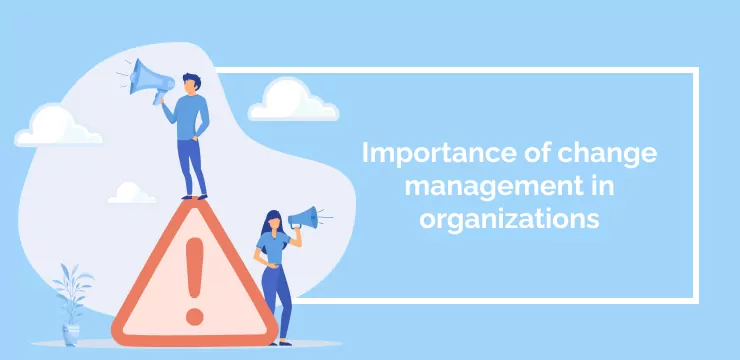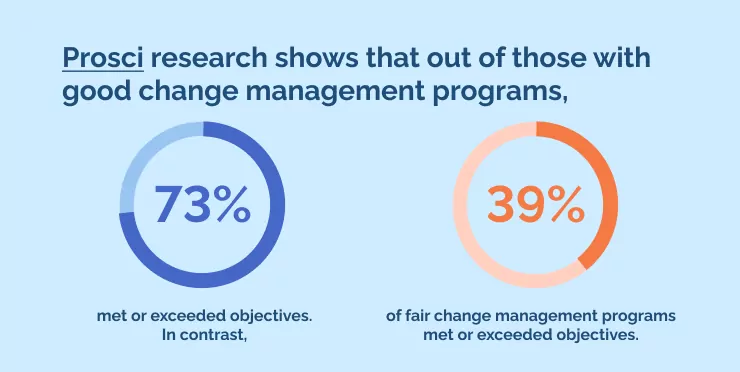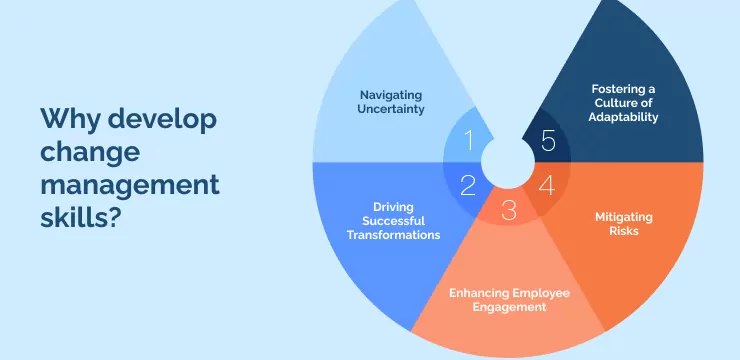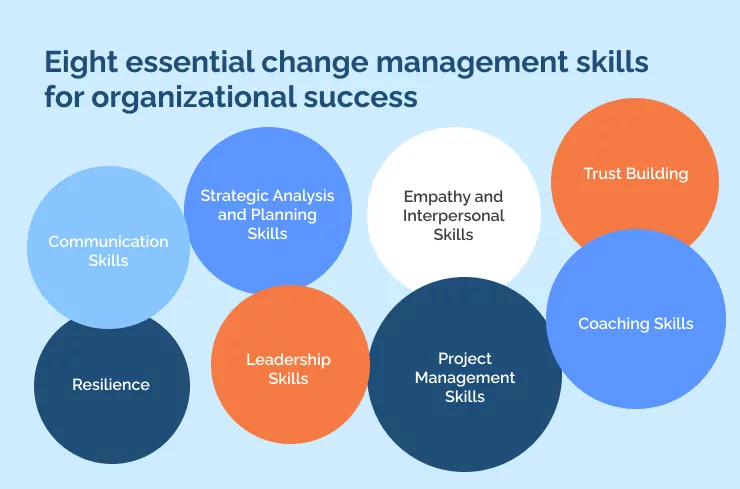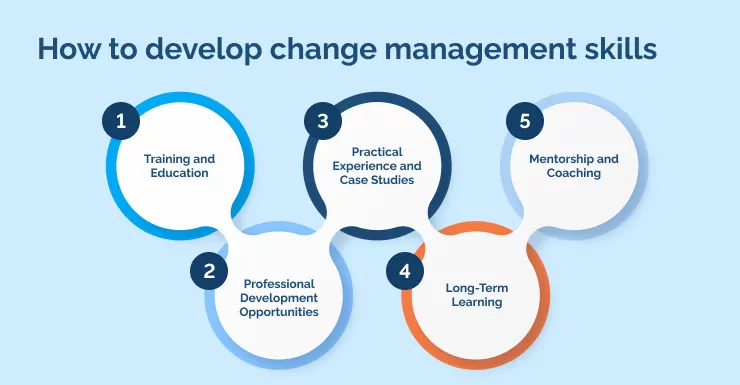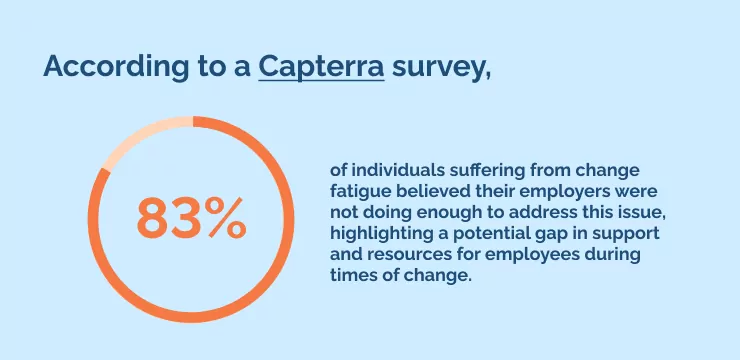
Change is mandatory for businesses to evolve and remain relevant in constantly innovating digital environments.
Every week there’s a new change to consider. Whether it’s making shifts to business models, adopting new digital tools, or the need to enhance customer experience (CX), organizations are increasingly faced with a choice to either evolve or become extinct.
As per Gartner, half of change initiatives fail, and only 34% are a clear success.
The regularity of such change has driven the need for it to be managed effectively. When change isn’t properly managed, it can become a disruptive force. Change can generate uncertainty, and the prospect of changing it can be daunting when we’ve grown to accept the status quo.
However, when managed successfully, the scope for positivity is greater than ever. This approach to change management ultimately determines the success of organizational transitions.
Though your approach will largely depend on your unique circumstances, some general principles and key qualities are at the helm of any effective change management strategy.
This article will explore eight essential change management skills for organizational success. We’ll first define change management skills and discuss their importance in organizations. We’ll also address the challenges of change management and why developing these skills is needed. Lastly, we’ll share practical tips on how to build your change management skills effectively.
What are change management skills?
Change skills are a crucial set of abilities that enable individuals to navigate and facilitate successful organizational change.
It goes beyond simply managing the logistics of change; it involves effectively leading and influencing people throughout the process. These skills encompass various aspects, including leadership, communication, strategic thinking, project management, empathy, and coaching.
According to McKinsey, a significant reason for the failure of change programs is the lack of engagement from both leaders and employees involved in the process.
Importance of change management in organizations
Organizations face numerous hurdles within the modern business arena, such as mergers and acquisitions, restructuring, or implementing new technologies.
Effective change management strategies are critical to navigate these transitions successfully. For instance, companies can experience employee resistance, misalignment of goals, and loss of productivity without a solid approach.
Take the example of a company that undergoes a merger but fails to address the cultural differences between the two entities. This can lead to conflicts, decreased employee morale, and hindered collaboration. On the other hand, organizations that implement a robust change management strategy and employ those with the right skills can create a smooth transition, ensuring seamless integration, fostering employee engagement, and ultimately driving growth.
Prosci research shows that out of those with good change management programs, 73% met or exceeded objectives. In contrast, only 39% of fair change management programs met or exceeded objectives.
Change management challenges
Several challenges often arise during the change management process that can impede any meaningful change. However, leveraging change management skills uniquely suited for addressing these challenges will help overcome them.
One common challenge is resistance to change. Change managers with strong communication and interpersonal skills can effectively engage stakeholders, address concerns, and build buy-in, increasing the likelihood of successful change adoption. Additionally, change managers with strategic analysis and planning skills can anticipate potential obstacles and devise mitigation strategies.
Another challenge is managing uncertainty and ambiguity. Change managers with empathy and emotional intelligence can support individuals throughout the change journey, alleviating anxiety and facilitating smoother transitions.
Moreover, project management skills enable change managers to establish clear timelines, milestones, and deliverables, ensuring efficient execution.
Furthermore, change managers proficient in coaching can guide and support employees, fostering a culture of enriched learning and growth. Organizations can facilitate change with agility, adaptability, and resilience by nurturing these skills.
Why develop change management skills?
It’s important to develop change management skills that sustain change in times where it remains the only constant across today’s business ecospheres.
As organizations face shifting market conditions, supply-chain disruptions, and the need for innovation, developing change management skills becomes crucial for professionals at all levels. Here’s why:
- Navigating Uncertainty: Change management skills empower individuals to navigate uncertainty effectively. With the ability to adapt to changing circumstances, professionals can help their organizations stay agile, make informed decisions, and seize opportunities even in turbulent times.
- Driving Successful Transformations: Change management skills are essential for successful organizational transformations. Whether implementing new technologies, restructuring, or adapting to market shifts, professionals with change management expertise can lead and support these initiatives, ensuring smooth transitions and impactful results.
- Enhancing Employee Engagement: Change can be unsettling for employees, leading to resistance and decreased productivity. Professionals with strong change management skills excel at engaging and motivating teams during periods of change. By fostering open communication, addressing concerns, and involving employees in decision-making, they create an environment where employees feel heard, valued, and motivated to embrace change.
- Mitigating Risks: Change introduces risks, including operational disruptions and stakeholder resistance. Professionals with change management skills excel at identifying and mitigating these risks by conducting thorough impact assessments, developing contingency plans, and executing proactive risk management strategies. Their ability to anticipate challenges and minimize potential negative impacts helps organizations navigate change smoothly.
- Fostering a Culture of Adaptability: Developing change management skills cultivates a culture of adaptability within organizations. Professionals who understand how to manage change effectively encourage continuous learning, innovation, and flexibility. They inspire teams to embrace new ideas, experiment with novel approaches, and drive positive organizational change.
Eight essential change management skills for organizational success
A lack of in-house expertise is commonly associated with bad change management. Change processes are infamous for their inability to be executed effectively. STAT
Change is doomed to fail when employees don’t have the prerequisite skills to ucceed.
Change managers typically take center stage when leading and implementing successful transformations.
They will take on various roles, including analyzing the need for change, developing strategies, communicating with stakeholders, and monitoring progress.
Due to the expansive nature of organizational change, roles and titles in the field of change management can vary significantly, often overlapping to cater to the specific requirements of each business. There are, however, some skills that are highly transferable to multiple positions.
By promoting the importance of a diverse skillset, you’ll maximize your team’s potential. Change managers should be well-equipped to deal with various specialisms, which will nurture confidence in the rest of the organization.
To accompany the skills taught, there are some great tools and techniques your team will benefit from mastering.
Here are eight vital change management skills which anyone involved with change should embrace:
- Communication Skills: Effective communication is at the heart of successful change management. Change managers must be adept at conveying complex information clearly and concisely. They should be skilled at tailoring their messages to different audiences, including executives, employees, and external stakeholders. Strong communication skills help build understanding, generate buy-in, and manage resistance during times of change.
- Resilience: There will be many setbacks during periods of change, but your ability to bounce back determines success. Smiling in the face of adversity goes a long way, and overcoming huge obstacles without panic is a highly sought-after skill. Change managers must quickly learn how to deal with limited resources and staff. You’ll need to occasionally shoulder the burden of an uncertain team, encouraging staff to get things off their chest. You might sometimes serve as their punch bag, but you must remain calm and be the voice of reason.
- Leadership Skills: Change managers need strong leadership skills to inspire and motivate teams throughout the change process. They should be able to set a compelling vision, provide guidance, and lead by example. Leadership skills are essential for fostering a positive and collaborative culture that supports change initiatives.
- Strategic Analysis and Planning Skills: Change managers must possess strategic analysis and planning skills to assess the organization’s current state, identify areas requiring change, and develop a roadmap for implementation. This involves conducting thorough assessments, analyzing data, and aligning change initiatives with organizational goals and objectives.
- Empathy and Interpersonal Skills: Empathy and interpersonal skills are critical for building trust and rapport with stakeholders affected by change. Change managers should be able to listen actively, understand diverse perspectives, and address concerns and resistance. By demonstrating empathy, change managers can foster a supportive environment and facilitate smoother transitions.
- Trust Building: Can you instill faith and confidence in your team? Does your team trust you? These are vital considerations for change managers. Staff will be incentivized to follow the directions of someone they trust. If instructions are given from someone who isn’t trustworthy, they are likely to fall flat. Building trust is all about being honest and readily listening to staff and acting on their feedback. It is about creating a two-way dialogue proving your value for your team’s efforts. People will seek advice from their line manager and confide in your answer. You should retain your integrity and reflect a positive need for change they can relate to. Staff will more likely believe and endorse change when a consistent line manager delivers it.
- Project Management Skills: Change initiatives often involve multiple projects and activities. Change managers must have strong project management skills to effectively plan, organize, and execute these initiatives. This includes defining project scope, setting timelines, managing resources, and monitoring progress. Project management skills enable change managers to ensure that change initiatives stay on track and deliver desired outcomes.
- Coaching Skills: Change managers play a coaching role in supporting individuals and teams through the change process. They should possess the ability to provide guidance, feedback, and support to help employees navigate uncertainty and develop new skills. Coaching skills help build resilience, enhance employee engagement, and facilitate successful change adoption.
How to develop change management skills
Developing change management skills is pivotal for generating positive outcomes during organizational transformation.
By honing these skills, professionals can play a key role in driving innovation and proactively managing disruptions to business operations.
According to a Capterra survey, 83% of individuals suffering from change fatigue believed their employers were not doing enough to address this issue, highlighting a potential gap in support and resources for employees during times of change.
Below we explore these skills in greater detail and provide actionable tips for implementing them effectively.
- Training and Education: Enrol in courses or workshops specifically designed to focus on change management principles and techniques. These programs will provide you with a solid foundation of knowledge and best practices in the field. Online platforms like Coursera, edX, and Udemy offer a wide range of change management courses from top universities and institutions.
- Professional Development Opportunities: Attend industry conferences, seminars, and webinars that provide insights into the latest trends and advancements in change management. These events keep you updated and offer valuable networking opportunities with experienced professionals in the field. Keep an eye out for relevant conferences and events organized by organizations like Prosci, a leading provider of change management training programs.
- Practical Experience and Case Studies: Seek opportunities to work on change management projects or volunteer for cross-functional teams. This hands-on experience allows you to apply theoretical concepts and learn from real-world scenarios. It’s also worth exploring case studies and success stories related to change management to gain further insights and practical knowledge.
- Long-Term Learning: Stay curious and actively seek resources such as books, articles, and online materials that delve deeper into change management theories and strategies. Regularly engage in self-study to enhance your understanding and expand your skill set. Websites like ASQ.org and Skillsoft offer change management training courses and resources to aid long-term education.
- Mentorship and Coaching: Find a mentor or coach with extensive experience in change management. They can provide guidance, share insights, and offer valuable feedback to help you grow and develop. Source professionals within your network or consider joining professional associations related to change management that offer mentorship programs.
Managing the uncertainty of change
Resistance to change is a common reaction, especially when we’re hard-wired to reject change.
A good change manager will give clarity to staff, helping them cope with change in less desirable circumstances. Strong leaders will embrace uncertainty and make positive efforts to explain how initial uncertainty can be channeled into positivity.
Everything can be learned from, and improvements can derive from questions. Leaders will manage uncertainty by clearly discussing when issues will be resolved and how staff can resolve queries together.
A good change manager will coach those who seem more sensitive, spotting a potential crisis and seeking to resolve it before it gets out of hand. When an individual needs support, you should be on hand to snap them out of it; otherwise, negativity, confusion, and disillusion can snowball.
With a mix of the above qualities, change managers will be perfectly positioned to lead organizations into a new era.
WalkMe Team
WalkMe spearheaded the Digital Adoption Platform (DAP) for associations to use the maximum capacity of their advanced resources. Utilizing man-made consciousness, AI, and context-oriented direction, WalkMe adds a powerful UI layer to raise the computerized proficiency, everything being equal.

